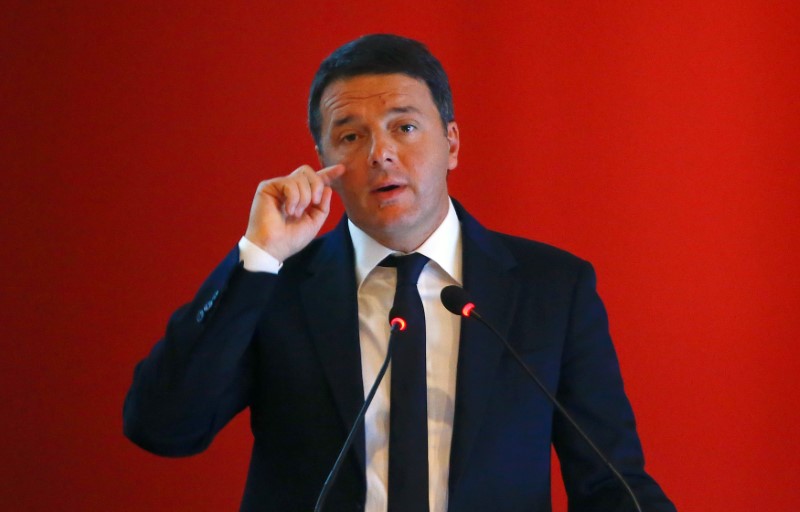By Isla Binnie and Rahul Karunakar
ROME/BENGALURU (Reuters) - Victory or defeat for Italian Prime Minister Matteo Renzi's constitutional reform referendum will hit financial markets only modestly, a Reuters poll found, with analysts split on how serious a "No" vote would be for the future of the euro project.
Renzi has said he will resign if he loses the Dec. 4 ballot - an outcome all opinion polls say is the most likely - on his plan to drastically reduce the role of the upper house Senate.
The Reuters survey of 32 analysts conducted on Nov 24-25 showed investors expected to demand an extra 25 basis points in yield to hold Italian debt over its German equivalent if the reform is rejected, with the euro dipping 1.25 percent.
Similar moves in the other direction are expected if voters approve the reform at the ballot box, which Renzi is presenting as a chance to speed up lawmaking and stabilise government.
While the poll consensus shows only muted reaction to either outcome, the European Central Bank said the risks are rising to euro zone financial stability and it would react to any "economic shock" from the vote.
The most pessimistic view in the poll was for a 70 basis point premium on the Italian/German yield spread and for the euro to fall as much as 10 percent.
Half the analysts polled see a "serious" blow to the euro project if Italians reject the plan, which those opposed to it say will over-centralise power and make Italy less democratic. The other half said the blow would not be serious.
"I think the market underestimates the long-term consequences of a 'No' outcome," said DekaBank economist Kristian Toedmann.
"Italy's reform agenda is a project for many years. If it fails, trend growth will not accelerate and government debt will become less sustainable. This cannot be compensated by (ECB) quantitative easing forever," he said.
Italy's chronically stagnant economy is struggling to post convincing growth and its debt pile, one of the world's biggest, keeps it under close investor scrutiny.
CRACK IN THE EURO PROJECT?
Many in the financial markets worry that, if Renzi resigns, the anti-euro 5-Star Movement could come closer to power.
Renzi has said he will not participate in any attempt to form a technocrat government of the kind that took over after Silvio Berlusconi's last administration collapsed in 2011.
"The 'No' scenario opens up a very volatile phase," said Intesa Sanpaolo (MI:ISP) fixed income strategist Sergio Capaldi. "In case of Renzi's resignation there is no clear path for the formation of a new government. A short-term government could just approve an electoral law for the Senate and announce early elections."
Further investor concerns focus on Italy's banks, which, saddled with 200 billion euros in bad loans, are holding back lending to small companies that traditionally relied on them.
Banca Monte dei Paschi di Siena, the world's oldest bank, is among the biggest worries as it plans a 5 billion euro ($5.29 billion) recapitalisation plan.
Monte dei Paschi plans to launch a stock sale on Dec. 7 or 8 into what could be turbulent markets if the referendum goes against Renzi and his government resigns.
"If the prospect loomed of a failed capital hike for MPS, the next hypothesis is a bail-in, which would have serious consequences," said IG strategist Vincenzo Longo, recalling the case of four banks the state rescued from bankruptcy last year.
"Given that last year four smaller banks created chaos above all among the public, MPS could lead to a bank run."

($1 = 0.9445 euros)